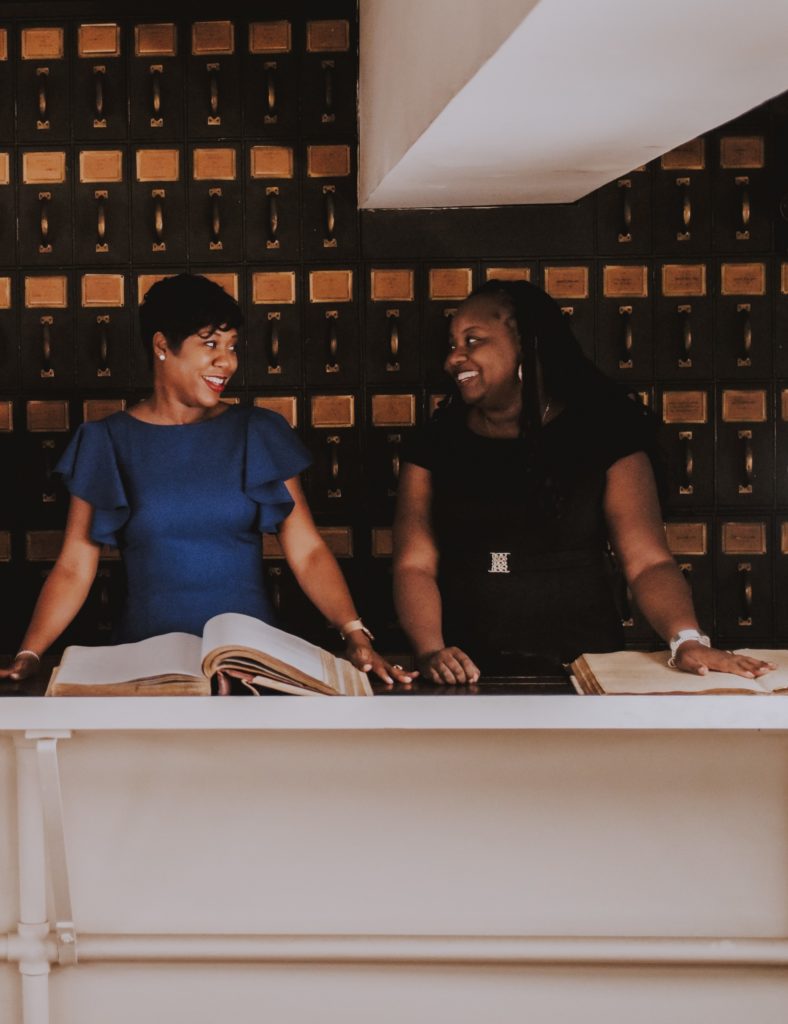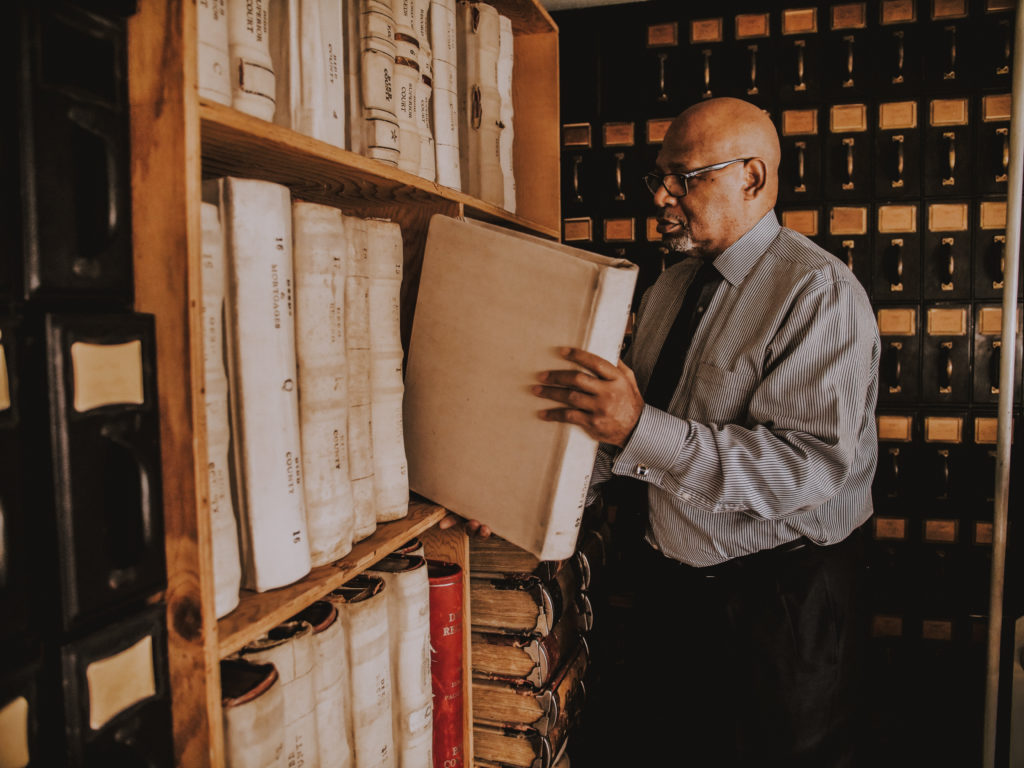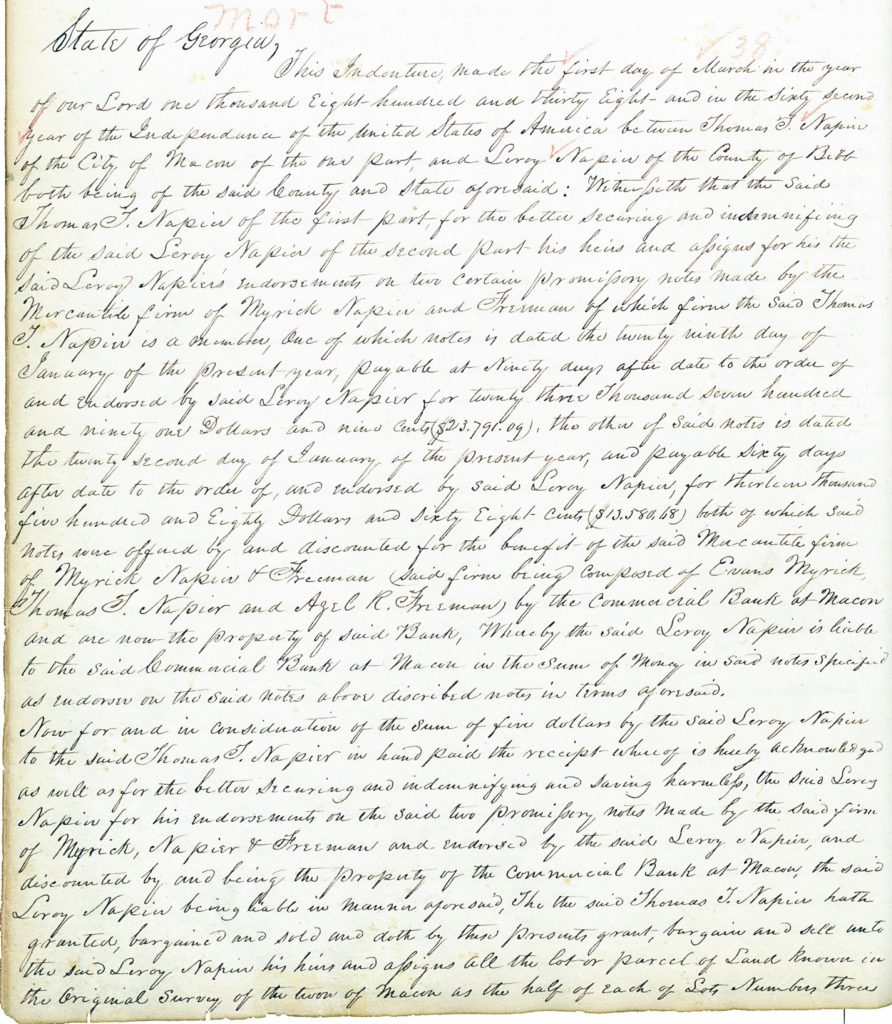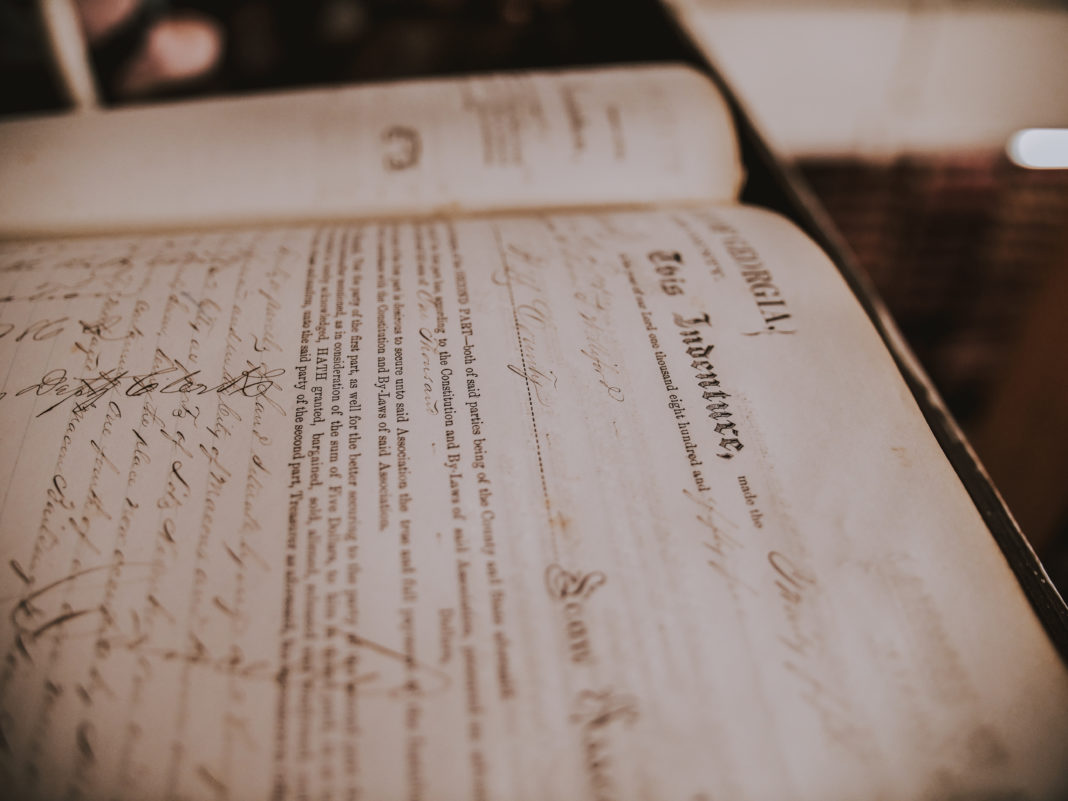Nine hundred and eighty slave transactions — and counting.
For years, Bibb County deed books from the 1800s sat unopened, collecting dust inside the courthouse. But since 2018, a team of researchers has been studying and cataloging their contents, which include the sale and lease of enslaved people alongside transactions of land, horses and other property.
Now, those records have been digitized and a searchable database is in the works, which will allow the untold stories of these African Americans to be shared and the public to learn more about the history of their ancestors as well as Macon.
“We have to be transparent, and this project is the epitome of transparency, whether we like it or not. We’re giving accurate primary source records of this county,” said Bibb County Superior Court Clerk Erica L. Woodford, who holds a juris doctor degree. “We’re proud of the project and know it’s going to be of benefit to the community and the world.”
Woodford, who earned bachelor’s degrees in African American studies and political science at Mercer in 1997, discovered slave records within the deed books while conducting inventory after taking office in January 2013. She shared her findings with Dr. Chester Fontenot Jr., director of Mercer’s Africana studies program and Baptist Professor of English. By 2018, the Clerk’s Office, Department of Africana Studies and Mercer University Libraries had launched an ambitious project to digitize Bibb County historical documents related to slavery.
The team focused on property deeds from 1823, the year in which Bibb County was incorporated, to 1865, the year slavery was abolished. Led by Research Services Librarians Adam Griggs and Stephanie Miranda Harkins, Mercer library staff were instrumental in establishing the methodology of the research, Dr. Fontenot said.
The researchers have now gone through all 17 volumes of those records, which total about 6,000 pages, most of it in difficult-to-read cursive handwriting. Four students have been involved — first 2019 graduates Tiffani Alexander and Addison Robinson and then 2022 graduate Franklynne Banks and 2021 graduate Kayla Hatchett — as well as some community volunteers. Alexander created a documentary highlighting this work for her senior project. Julie Grimm, an employee in the Superior Court Clerk’s Office, is the chief indexer for the project.
These historical documents, stored in the mezzanine area of the records vault at the Superior Court Clerk’s Office, were already available for public viewing by request. Now, the collections are also preserved in their entirety in a digital format, Woodford said. To view the scanned pages, create a free account at bibbclerkindexsearch.com/external, and then click on the “historical records” tab.

In addition, a separate, searchable database is now being created. Researchers cataloged details of all deeds involving the sale or lease of slaves and apprenticeship agreements of freed slaves, Woodford said. The records are being cross-checked by a second set of eyes and then reviewed for accuracy by a third person, Dr. Fontenot said.
Once the records are verified, they will be entered into a Clerk’s Office software program. When the site is live, people will be able to search for names, characteristics, transaction amounts and more, said Superior Court Chief Deputy Clerk Stephanie Woods Miller, who holds a juris doctor degree.
Dr. Fontenot said a narrative component for an additional website will be written to provide further context. Research already completed on Jarrell Plantation State Historic Site, a former cotton plantation farmed by enslaved laborers, will also be included, and other relevant projects can be housed on that digital platform in the future. COVID-19 delayed the work, but the goal is to launch this portion of the project by summer 2023, Dr. Fontenot said.
“This is the most important research that I’ve done in my career so far,” Dr. Fontenot said. “When we roll (the database) out, it’s going to be right. How do I know that some of my ancestors aren’t in these documents? I’m going to pay tribute to my ancestors by doing them right. Whether they’re in these books or not, they’re still my people.”
Dr. Fontenot said the database will be tremendously valuable for genealogical purposes, and people have already expressed interest in using it for family research once it’s up and running. He believes it will also be of interest to teachers, students and scholars. Looking at this primary source material is powerful and provides better context and understanding to slavery and what happened in Macon.
“Once it’s accessible widely, I think it will be an important resource for families who want to research their own story,” said Dr. Anita Gustafson, dean of the College of Liberal Arts and Sciences. “It will be important in finding names. What this has the possibility of doing is offering a more complete story to the impact of slavery upon Middle Georgia and a window into the lives of these human beings, these individuals. Having that more widely accessible is important to scholars of the South, scholars of African American history but also to individuals wanting to find out more about their own family story.”

Access to these kind of primary source documents related to slavery is rare, Dr. Fontenot said. While Bibb County’s books are in good condition, records from many other courthouses were destroyed during floods or fires or hidden in locations that are now unknown.
The records of slave transactions within the deed books have shed new light on Macon’s past and involvement in the slave trade. It also shows how little of this history is taught in school, Miller said.
“Bibb County was serving as a kind of center for slave transactions,” Dr. Fontenot said. “We found records of people coming from Florida, Louisiana, Alabama, Tennessee, Mississippi to Macon to purchase Black people as slaves. We know there were some sites that served as auction sites. One was right in front of the courthouse; another was in front of City Hall. We knew that slavery occurred here, but we didn’t know before how central Macon was to the slave trade in the Southeast. This project has really opened eyes, including our own, and uncovered a lot of information.”
While 980 transactions involving slaves have been found so far in the deed books, the number of people involved is actually far greater. Dr. Fontenot said most of the sales involved multiple slaves, and one involved the sale of around 220 people.
“This represents the history of our ancestors,” Miller said. “I know that I am always wondering if one day I’m going to see one of them in these books. I think it’s a great opportunity for people to have honest dialogue about what this country has been through, face that, and make a path for a better future.”
It was surprising and shocking to discover prominent families of the time linked to slave ownership, Woodford said. Streets and monuments in Macon were built and named after people who were slave owners. The records have also revealed the locations of some plantations that existed in Bibb County, including on the outskirts of the Ocmulgee Mounds National Historical Park, Miller said.

The books also show instances where companies like the railroad leased slaves from landowners for construction projects, Woodford said. Enslaved people were also listed as collateral notes and insurance, Miller said. One note even showed the city council giving the mayor permission to use city funds to purchase a slave to help him, Dr. Fontenot said.
It’s sobering to realize that in addition to these transactions taking place, three or four people were witnessing them, as required by law.
“It’s very revealing the extent to which slavery was at the core of the culture, society and government,” Dr. Fontenot said. “It’s an exciting project but also a very psychologically and spiritually draining project. You work on it a while, and then it hits you … we’re looking at the sale of our people. We know it happened, but there it is. It’s like we’re reliving it working on this project.”
The researchers have had to take a break from time to time, because of the emotional toll of the work, Dr. Fontenot said.
“The original clerk of court owned people as slaves, and now here I am, a (potential) descendent of enslaved people, as the clerk of court and the first African American to hold this position,” Woodford said. “That’s very interesting and very telling of how far we have come. I am hopeful for the future. We are preserving the past but also protecting from future trauma.”
After the components related to the deed books are completed, the next phase will involve locating chain gang records and digitizing them, Dr. Fontenot said. In addition, the larger goal is to expand the project outside of Bibb County to the Middle Georgia area. A few neighboring counties have already asked for help with their research once the work in Macon is complete.
Even though the online resources have not yet launched, word of the research efforts has already started to spread nationally and internationally. People across the country and a few abroad have contacted Dr. Fontenot to learn more about the project. In addition, he, Miller and Woodford have received overwhelmingly positive feedback after presenting on their research and methodology during conferences.









